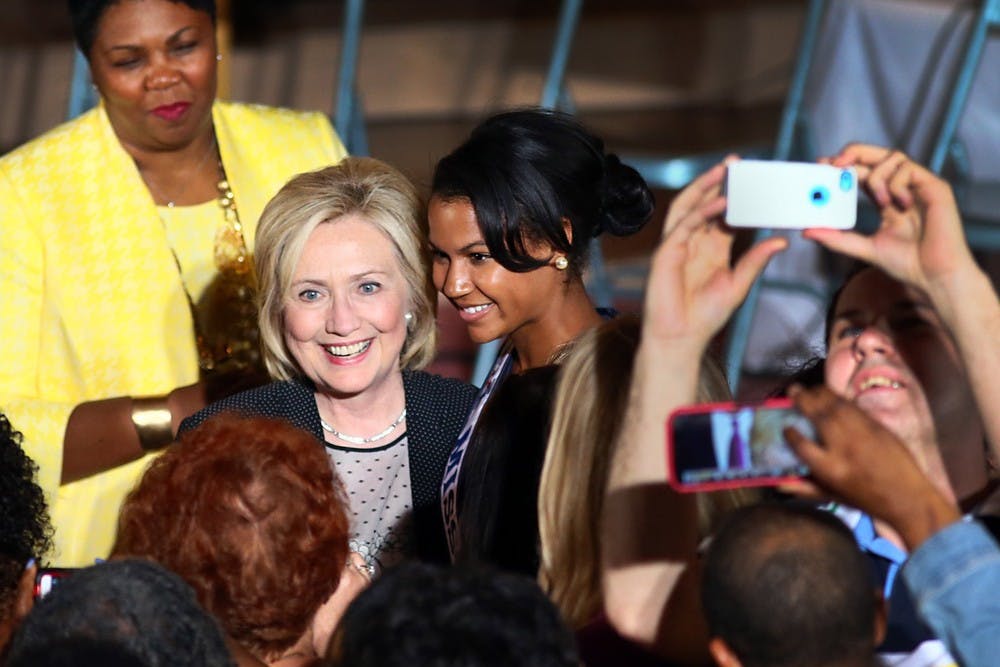Politicians have been using the media to their advantage ever since the Richard Nixon-John Kennedy debates and Franklin Roosevelt’s fireside chats. It is difficult to imagine that someone like Thomas Jefferson would have been keen to the idea of appearing on something like "Saturday Night Live," but in today’s world, anything goes.
Last Saturday, Democratic presidential candidate Hillary Clinton appeared on "SNL" and convinced every single young voter that she was a funny, chill, hip and easy-going candidate. No one was worried about her stashing a secret private server in her house; we were all too busy laughing and admiring her ability to keep a straight face through her comical skit.
This is not the Clinton you will see at the upcoming Democratic debate, she will be focused, stern and strong — she even has a Snapchat. This is not to single Clinton out. Most, if not all, politicians change their persona to fit their audience.
This political strategy has been around ever since platforms such as radio and television were created. In 1960, JFK appeared on Jack Paar’s "Tonight Show," In 1968, Nixon took a seat on a popular show of the time, "Rowan & Martin’s Laugh-In."
The list goes on. Bill Clinton played the saxophone on "The Arsenio Hall Show" in 1992; George W. Bush delivered a Top Ten list on "Late Night with David Letterman" in 2000; Republican vice-presidential nominee Sarah Palin made her way onto "Saturday Night Live" in 2008; President Barack Obama and then-Republican presidential candidate John McCain have also appeared on "SNL;" and former Massachusetts Gov. Mitt Romney made an appearance on "The Tonight Show" with Jay Leno in 2012.
In the age of mass media, being the serious, focused and somewhat private politician is not nearly as valued as it was before technology was so heavily integrated into voters’ lives. Now, it is just as important for a politician to be a comedian as it is for them to be a leader. Successful late night show appearances are just as vital for the success of politicians as successful GOP debates are.
Almost all politicians are on Twitter now, including every single current presidential candidate. Using outlets like Twitter allow for politicians to quickly communicate with young voters. It does not require too much of their time or attention and this is why it is so successful with young voters.
If today’s candidates really want to use the media to their full advantage, they are going to have to take their media manipulation to the next level.
Most young voters will not sit through hours of debates. These voters are busy and they simply do not care. They know that they will catch the key points of the debate on Twitter later that night. They will make time for entertainment though. So, if politicians want to ensure that they are getting their ideas across to young voters, they are going to have to do it in a sneaky way.
This is not to say that all millennials ignore the news and only pay attention to content that is delivered through humor, but these millennials are the minority of their generation.
Politicians need to keep the humor and continue to appear on late night shows, but they must quit selling themselves short. They need to use these shows to also talk about their policies. This is not to say that they should give a speech, but within their humorous skits, they should put more of an emphasis on their values, their ideas, and their plans.
Millennials care about these things to, they just are not willing to go as far as other generations are to seek these things out. Millennials want to hear the ideas of politicians, they just want it delivered in an entertainment format opposed to a structured debate or news appearance.
Related Links:
Facebook, India work together on Internet connectivity, disagree on LBGT rights
Tech Spec: Recruiting political insight through technology
Reach the columnist at Alexis.Berdine@asu.edu or follow @AlexisBerdine on Twitter
Editor’s note: The opinions presented in this column are the author’s and do not imply any endorsement from The State Press or its editors.
Want to join the conversation? Send an email to opiniondesk.statepress@gmail.com. Keep letters under 300 words and be sure to include your university affiliation. Anonymity will not be granted.
Like The State Press on Facebook and follow @statepress on Twitter.




